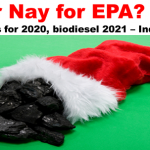Warren Buffett: Closet Tree-Hugging Billionaire
By Jeff Siegel Is Warren Buffett sending mixed messages on green energy? That's what the folks over at Bloomberg Business have suggested. But nothing could be further from the truth. After all, Buffett's making a fortune in the alternative energy space. Yet here's what was reported in Bloomberg this week: Warren Buffett highlights how his Berkshire Hathaway Inc. utilities make massive investments in renewable energy. Meanwhile, in Nevada, the company is fighting a plan that would encourage more residents to use green power. Berkshire’s NV Energy, the state’s dominant utility, opposes the proposal to increase a cap on...
The Utility Death Spiral: Beyond The Rhetoric
by Lynne Kiesling Unless you follow the electricity industry you may not be aware of the past year’s discussion of the impending “utility death spiral”, ably summarized in this Clean Energy Group post: There have been several reports out recently predicting that solar + storage systems will soon reach cost parity with grid-purchased electricity, thus presenting the first serious challenge to the centralized utility model. Customers, the theory goes, will soon be able to cut the cord that has bound them to traditional utilities, opting instead to self-generate using cheap PV, with batteries to regulate the intermittent...
Our Energy Bubble
Tom Konrad CFA Our energy policy looks like a bubble. Bubbles are a social phenomenon at least as much as they are a financial phenomenon. At the top of bubbles, participants ignore glaringly obvious risks. In October 2007, Meredith Whitney pointed out the almost glaringly obvious fact that Citigroup was paying out more in dividends than it was earning in profits (i.e. it was being run like the US government, but without a friendly Federal Reserve to bail it out by printing money.) She said that Citigroup would need either to raise capital,...
Hurricane Sandy: “It’s Global Warming, Stupid”
Garvin Jabusch On today's broadcast of the news show Democracy Now hosted by Amy Goodman, Cynthia Rosenzweig, co-chair of the New York City Panel on Climate Change, went out of her way to begin her comments on Hurricane Sandy and the effects of global warming to issue a disclaimer: "but first Amy, I need to make something very clear: any one storm cannot be associated directly with climate change…we have to be very careful not to say Hurricane Sandy was caused by climate change." Unfortunately, this could easily be taken to imply that warming and Sandy may have...
Obama’s New Energy and EPA Appointments
Jim Lane Ernest J. Moniz is the nominee for US Secretary of Energy In Washington, President Barack Obama nominated MIT professor Ernest J. Moniz as US Secretary of Energy, replacing Steven Chu, and nominated Gina McCarthy as EPA Administrator. Moniz is currently serving as the Cecil and Ida Green Professor of Physics and Engineering Systems, as well as the director of the MIT Energy Initiative (MITEI) and the Laboratory for Energy and the Environment. He was formerly undersecretary of Energy and associate director of the White House office...
Trump Administration Flip-Flops On Oil Refinery Waivers Again, Farm Groups Protest Again
by Jim Lane
In Washington, what must have become a weary if vigilant posse of the nation’s biofuel and farm advocates are out on the hustings again this week, over a fresh attack on the US Renewable Fuel Standard, this one led by officials in the Trump Administration, if a story reported by Bloomberg stands up against scrutiny.
What has been described as a “misinformation campaign spearheaded by Senator Ted Cruz” is seeking to overturn a unanimous court decision that would halt the Environmental Protection Agency’s abuse of Small Refinery Exemptions (SREs) under the Renewable Fuel Standard.
The backstory
In a unanimous panel, the...
EPA Reneges on Trump’s Biofuels Deal
by Jim Lane
“EPA Reneges on Trump’s Biofuels Deal”, said the Iowa Renewable Fuels Association in reacting to the US Environmental Protection Agency’s new plans for fulfilling federal renewable fuel requirements. EPA released a proposed supplemental rule for the Renewable Fuel Standard today, and the bioeconomy is up in arms, and the outrage is centered in farm country, once a Trump bastion of support.
“IRFA members continue to stand by President Trump’s strong biofuels deal announced on Oct. 4, which was worked out with our elected champions and provided the necessary certainty that 15 billion gallons would mean 15 billion gallons, even after...
Biofuel Industry Reacts To EPA New Renewable Fuel Standard
Yay or Nay for EPA? RFS Volumes out for 2020, Biodiesel for 2021 – What’s the reaction from industry?
by Jim Lane
What’s the reaction from industry? Coal for Christmas?
Should Santa bring coal for EPA’s stocking this year? Do the biofuels and agriculture industries think the EPA just put coal in their stocking? Is it thumbs up or thumbs down from biofuel industry advocates on last week’s U.S. Environmental Protection Agency renewable fuel volumes? What about the exempted volumes?
The Ruling – Rotten or Respectable?
First, a bit on the EPA ruling that establishes the required renewable volumes under the Renewable Fuel Standard (RFS) program for...
Aggressive New CAFE Standards; The IC Empire Strikes Back
John Petersen Last Friday President Obama and executives from thirteen leading automakers gathered in Washington DC to announce an historic agreement to increase fleet-wide fuel economy standards for new cars and light trucks from 27.5 mpg for the 2011 model year to 54.5 mpg for the 2025 model year. While politicians frequently spin superlatives to describe mediocre results, I believe the President's claim that the accord "represents the single most important step we've ever taken as a nation to reduce our dependence on foreign oil" is a refreshing example of political understatement. After three decades of demagoguery, debate,...
Renewable Fuel Producers Score A Win
Despite Trump’s vow to roll back all measures endorsed by Obama, his Environmental Protection Agency head Scott Pruitt is backing off plans to scuttle the U.S. biofuel policy. The Trump administration had planned to change regulatory standards to reduce the amount of renewable fuel that must be blended with conventional fossil fuel for gasoline and diesel supplies. In the third week in October 2017, Pruitt sent a letter to Congressional leadership indicating the renewable fuel volume mandates for 2018 would remain unchanged.
Most analysts saw the about face as a win for ethanol and renewable diesel producers such as Green Plains (GPRE: Nasdaq), FutureFuel...
How New England Can Eliminate Oil Use For Single Family Homes for Less Than...
Chris Williams We can use simple, effective, and proven policies that have been used to supercharge the New England solar PV industry to incentivize renewable thermal technologies and eliminate oil use for single family homes. Here's the best part, the policies will be cheaper than solar PV, they will create more local jobs per kW installed and displace more expensive fuel. At Renewable Energy Vermont 2012, I delivered a presentation on how a production-based incentive for renewable thermal technologies, like the $29/MWh incentive in New Hampshire, would be cheaper than the current solar PV incentive in Vermont and...
The Farm Bill: 5-Minute Guide to the Energy Title
Jim Lane Only 5 min BigStock Photo What’s in that Durn-tootin’ US Farm Bill, anyhow? For the harried taxpayer, some relief. For energy security and rural economic development, targeted investments that now head to the legislative floor. Here are the need-to-knows. In Washington, the House and Senate Agricultural committees have now passed their respective versions of the proposed 2013 farm bill, which would take effect for fiscal 2014 through fiscal 2018. Both bills have energy titles meaning that, should they find passage, as expected this summer,...
Shifting the Cost of Pollution
by Debra Fiakas CFA The U.S. Environmental Protection Agency has agreed to review the recently enacted MATS Rule - Mercury & Air Toxics Standards that went into effect at the end of 2011. At least two dozen states and forty utility companies have filed suit against the EPA over the rule, which is intended to cap mercury and other toxic emissions as well as particulates. The rules particularly impact power plants that use coal-fired boilers to generate electricity. The EPA provides an interactive map to see where these plants are located. They are predominantly in the eastern half...
Two Numbers: One Matters, the Other Gets All the Attention
Garvin Jabusch This morning, in the realm of those who follow such things, the world became aware of two newsworthy numbers, 69,000 and 400. The former number is how many jobs were added to the U.S. economy in May according to the Bureau of Labor Statistics (BLS); the latter is how many parts per million (ppm) in our atmosphere are represented by carbon. You can guess our opinion: 400 parts per million is a far more significant milestone than the apparent ‘bad news’ of America adding 69,000 more jobs. The jobs number is, at best, banal ephemera....
Why We Need More Energy in the Economy But Less in the Atmosphere
Garvin Jabusch Preface: As per my usual, this post is more or less a narrative, and is definitely not math-centric. But, still, nothing quite conveys the stark reality of a thing like its governing equation. So, two of those found their way in here, but both are short and explained in English. With that, let’s look at why energy is so good. And bad. Any system in nature, including the human economy, is bound by a simple fact: it can only thrive and grow in proportion to the energy inputs it has access to. Energy equals growth. In economic...
The Environment Is On The Ballot. Vote November 6th
AltEnergyStocks.com first endorsed a presidential candidate in 2008. We endorsed Barack Obama based on his more pro-environmental, pro-alternative energy stance compared to his opponent, John McCain. Choosing between John McCain and Barack Obama took some research, since both candidates struck a somewhat pro-environment tone. Our choice rested on the fact that Obama seemed to have a deeper commitment to environmental causes. Our 2012 endorsement of Obama over Romney was also based on a comparison of their proposed policies.
Fast-forward to 2016, and the decision between the candidates was no longer one that required much analysis. The choice could not have...






